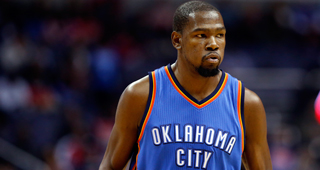To be so immeasurably good yet to play such a single-minded and predictable type of late game basketball. Kevin Durant and Russell Westbrook approached their peak powers in these playoffs after injuries compromised their runs in 2013, 2014 and 2015, and got just enough help out of their role players that they nearly finally moved past their long incubation period.
It took a grind of a Game 5 responding to the twin blowouts in Oklahoma City, a historic Klay Thompson three-point barrage in Game 6, and an overwhelming, role player ignited 29-12 third quarter in Game 7 to kill off the 3-1 lead the Thunder had over the Warriors in the Western Conference Finals. It was a series in which the Thunder exhibited their unstoppable best and their exasperating worst ahead of their most consequential offseason in their history.
You can’t win in the NBA anymore without an engaged, expertly assembled and liberated supporting cast. Defenses are too intelligent and the game is played at too high of a level now where you wear down physically and mentally under that constant level of stress of playing 2-on-5. The NBA historically has either had star players or role players, but title teams now really need that holy grail type of in-between player, a star who functions like a role player.
The Thunder still have not cultivated that type of rarefied player and unlikely ever will. The Warriors have two in Klay Thompson and Draymond Green as stars with a role player approach to complement their deferential MVP in Stephen Curry. Neither Durant nor Westbrook will be obsequious enough to function as a remade role player. James Harden was never willing to play a Thompson role of committed defense and complementary scoring. While it looked like Serge Ibaka would emerge in that role with his rarefied rim protection and spot-up shooting, his game has plateaued to merely being good instead of borderline All-Star great.
Green was the element that turned the Warriors from good to great last season and they had a full season to refine how to use him in a larger role that grew even more impactful when he became an All-Star this season. The Warriors were stuck in the first and second round of the playoffs, changed coaches and turned Thompson and Green into All-Stars to bypass the Thunder, who are stuck in the Conference Finals not quite good enough.
The Thunder still don’t have a corresponding player like Green, but in parts of these playoffs, you could see how special this team could be when Andre Roberson abruptly became a credible offensive player and with how Steven Adams has developed with his energy on defense and on the glass. Durant and Westbrook are great enough where they don’t need an All-Star role player, but they do need their role players to meaningfully contribute on offense to avoid the constant blizzards of a fourth quarter.
You can pinpoint dozens of reasons why the Warriors completed an astonishing comeback, but for me the Thunder were one solid offensive game from Roberson away from winning this series. Roberson started hitting shots in Game 6 against the Spurs and continued that trend against the Warriors until Game 7. Roberson was 2-for-11 in Game 7 and 0-for-4 on three-pointers compared to a combined 15-for-24 from the field and 5-for-9 on three’s in Oklahoma City’s three wins of the series. The first play of Game 7 for the Thunder was to setup Roberson up for a wide-open corner three-pointer that he missed. Roberson’s confidence was gone by the second half and Durant yelled at him at one point for passing on an open three-pointer.
But at times in this series, Roberson wasn't merely a very good defender anymore as he was hitting the wide-open three-pointers he was being dared to shoot and cutting baseline for dunks and setting screens before slipping down the lane to the bucket. When the Thunder were running the Warriors off the floor in Games 3 and 4, Roberson was scoring enough to create some level of consequence for helping on Westbrook and Durant.
I asked Durant and Westbrook after their Game 7 loss whether they’re encouraged by the way those younger role players have come along.
“Those guys, man, they put in work every single day,” said Westbrook. “Coming in early, staying here late, watching film, improving their games throughout the season, and you can't do nothing but be proud of those guys. Look forward to them coming back next year and being better.”
The level of commitment to defense from Durant and Westbrook in these playoffs were a first for their careers. If they can afford to expend more energy on defense due to the offensive contributions from Roberson, Dion Waiters, Ibaka, Adams and Enes Kanter. Oklahoma City instantly becomes a better and more cohesive team on both sides of the floor when they get that level of contribution on defense. Title teams are usually in the top-5 on both offense and defense and there’s no doubt they get there by recalibrating their usage.
The Thunder completely forced the Warriors out of their normal offense for most of the series due to their ability to switch everything and their length in the passing lanes as well as the rim. Durant and Westbrook have the athleticism, length and basketball intelligence to be top-5 players in league at their position on defense if they can be practical with how they use their efforts.
The story of their regular season and the Game 6 loss was how the Thunder would squander leads with a comically impotent and unimaginative late game offense so frequently featuring no-pass or one-pass possessions. Oklahoma City would predictably sit on leads by running down the shot clock before Durant and Westbrook would take turns on isolations in which defenses could send help to clog up their space. With their stationary teammates not a threat, scoring becomes really difficult no matter how good you are.
The Thunder gratuitously rely on the offensive brilliance of Westbrook and Durant, second chance points with their length, and a high free throw rate. Westbrook and Durant can draw help on every possession to rotate the ball, put the defense through the wash to generate high quality looks, but they still revert back to that feeling of needing to empty that clip. The contradiction of their offense is Durant and Westbrook are inherently selfless players who play selfishly relying on themselves.
Durant and Westbrook are the NBA’s most talented teammates since Shaq and Kobe but they genuinely love each other and are not obsessed with individual achievements. These aren’t stubborn, selfish narcissists as much as pragmatists with bad late game habits.
Durant and Westbrook took up about 70 percent of their late game possessions during the regular season and it rose to nearly 80 percent in the playoffs. Just like Scott Brooks always knew he should stagger the minutes of Durant and Westbrook but couldn’t get them to buy-in, Billy Donovan knows how much easier late game situations would be if the Thunder had better ball movement. You so rarely see anyone besides Durant and Westbrook attempt a big shot despite facing defenses that are daring them to pass the ball to a role player.
“They do a good job of loading up and making me see bodies,” said Durant after Game 7. “So I was seeing just a crack and a crease, and I was trying to be aggressive. Like you said, I can't leave anything in the clip, you know? This is the last game, I had to let it all fly.”
The history of the NBA is dominated by its all-time stars, but so many career-defining, clutch moments have been big shots made by role players. In 1998, Michael Jordan is isolated one-on-one in Game 6 against Byron Russell because the Jazz sent a double-team at Jordan who found Steve Kerr for the game-winner in 1997. The game-winning shots of John Paxson in 1993, Robert Horry in Game 4 in 2002 against the Kings and again in 2005 with the Spurs against the Pistons. Bruce Bowen, Mario Ellie, Mike Miller and late career Ray Allen routinely made those types of big shots.
Heading into Game 7, you knew there would be no late game Roberson or Waiters shot to win it for the Thunder; they would either coast on a lead or Durant and Westbrook would make a series of spectacular plays. But Durant and Westbrook shot just 1-for-12 with five turnovers in “clutch situations” during the series.
Kerr repeatedly referenced the coast-to-coast dunk in the third quarter of Game 7 by Shaun Livingston as shifting the game. Livingston struggled in the series but made one of its defining plays. The Warriors had 11 players score in Game 7 compared to just six for the Thunder. At one point in the series, Curry summarizingly said: “We're at our best, when everybody has an impact on the game.”
Oklahoma City has a lot of ways of getting better within their current roster. Kanter and Waiters were drafted with top-5 picks to be stars, given up on by the Jazz and Cavs and bought low by Sam Presti. These are two of the league’s most imperfect yet talented players, though they probably will need to let Waiters leave in free agency and may consider trading Kanter into a team’s cap space in 2017 to take care of ultra max deals for Durant, Westbrook and Ibaka, along with Adams’ extension. Cameron Payne should see minutes at least double next season to give the Thunder a different type of small-ball lineup, while Mitch McGary is still around with upside if he can stay healthy and was crying walking to the tunnel in a series he didn’t play in.
Adams is a beast who will continue to get better around the basket on offense and even craftier and stronger on defense. Roberson has grown into a smart cutter off-ball and is 100,000 three-point shots in an empty gym away from changing the balance of the NBA.
No superstar has ever left a team as talented as the Thunder and Durant will be betting on being so close to figuring out how they can get that final one percent of their role players right to approach being nearly as good as the sum of their parts.



